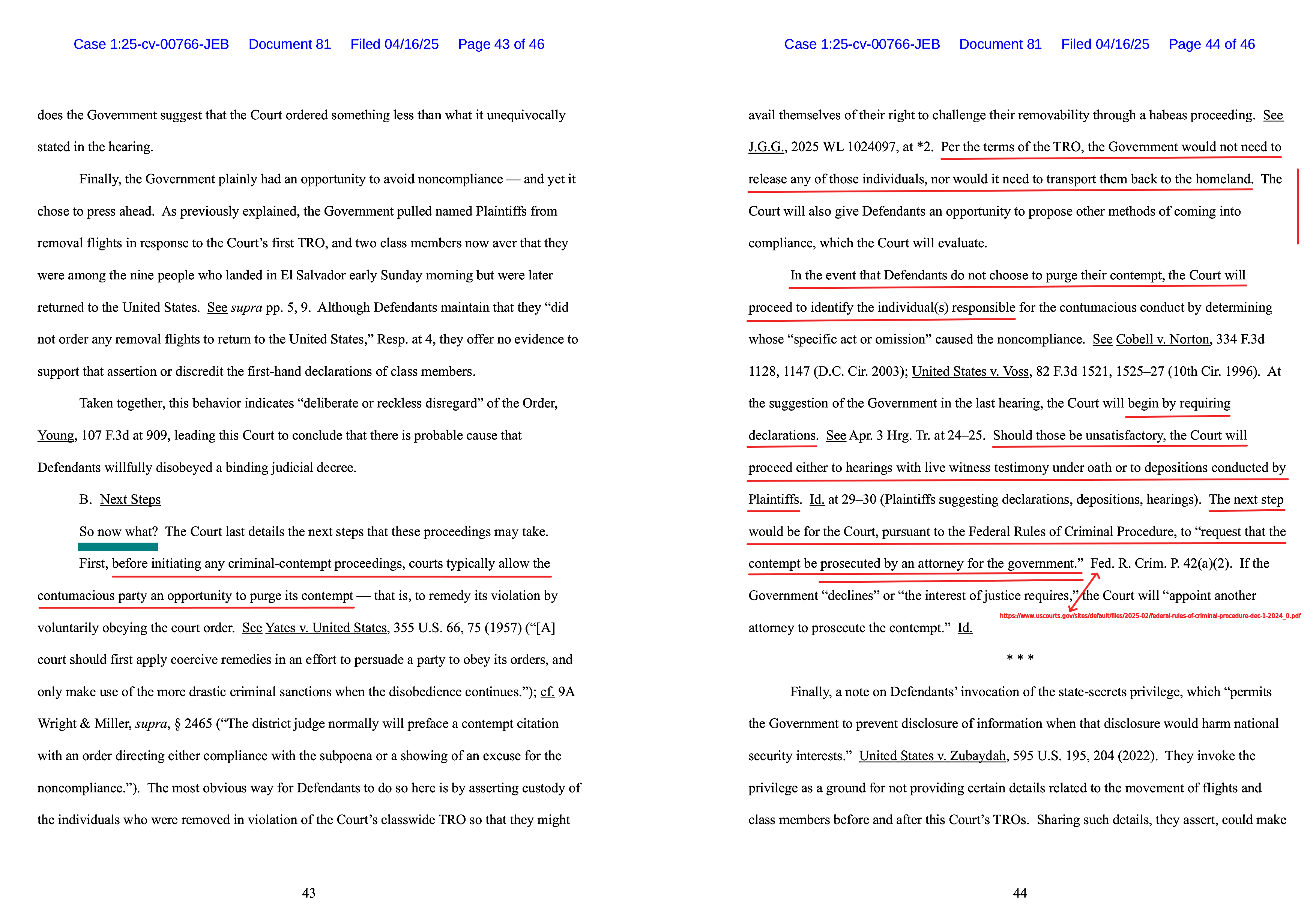Der District Court für den District of Columbia hat am heutigen Mittwochabend (MESZ) – durch Richter Boasberg – folgende Entscheidung in dem Verfahren wegen Alien Enemies Act / Tren de Argua getroffen:
„Given the finding of probable cause for contempt set forth in the accompanying Memorandum Opinion, the Court ORDERS that:
1. If Defendants opt to purge their contempt, they shall file by April 23, 2025, a declaration explaining the steps they have taken and will take to do so; and
2. If Defendants opt not to purge their contempt, they shall instead file by April 23, 2025, declaration(s) identifying the individual(s) who, with knowledge of the Court’s classwide Temporary Restraining Order, made the decision not to halt the transfer of class members out of U.S. custody on March 15 and 16, 2025.“
(https://storage.courtlistener.com/recap/gov.uscourts.dcd.278436/gov.uscourts.dcd.278436.80.0_1.pdf)
rule of law – zum Schutze der Individuen
In der 46-seitigen, separaten Begründung wird unter anderem erklärt, warum auch Gerichtsentscheidungen, die später von einem höheren Gericht aufgehoben werden, nicht vorher eigenmächtig mißachtet werden dürfen (ob es trotzdem manchmal richtig ist, Gerichtsentscheidung zu mißachten, ist eine politische – keine juristische – Frage):
„One might nonetheless ask how this inquiry into compliance is able to proceed at all given that the Supreme Court vacated the TRO after the events in question. That Court’s later determination that the TRO suffered from a legal defect, however, does not excuse the Government’s violation. Instead, it is a foundational legal precept that every judicial order ‚must be obeyed‘ — no matter how ‚erroneous‘ it ‚may be‘ — until a court reverses it. Walker v. City of Birmingham, 388 U.S. 307, 314 (1967). If a party chooses to disobey the order — rather than wait for it to be reversed through the judicial process — such disobedience is punishable as contempt, notwithstanding any later-revealed deficiencies in the order. See id. at 314, 320. That foundational ‚rule of law‘ answers not just how this compliance inquiry can proceed, but why it must. See id. at 320. The rule ‚reflects a belief that in the fair administration of justice no man can be judge in his own case,‘ no matter how ‚exalted his station‘ or ‚righteous his motives.‘ Id. at 320–21.“
(https://storage.courtlistener.com/recap/gov.uscourts.dcd.278436/gov.uscourts.dcd.278436.81.0_5.pdf, S. 2; Hyperlinks hinzugefügt; siehe ausführlicher zu der im Zitat diskutierten Frage ebd., 17 – 22 [bes. 17 f.])
Es wird auch angedeutet, warum es problematischer ist, wenn Regierungen Gerichtsentscheidungen mißachten, als wenn es Individuen tun (ja, es ist eine angelsächsische Gerichtsentscheidung; keine deutsche):
„The Constitution does not tolerate willful disobedience of judicial orders — especially by officials of a coordinate branch who have sworn an oath to uphold it. To permit such officials to freely ‚annul the judgments of the courts of the United States‘ would not just ‚destroy the rights acquired under those judgments‘; it would make ‚a solemn mockery‘ of ‚the constitution itself.‘ United States v. Peters, 9 U.S. (5 Cranch) 115, 136 (1809) (Marshall, C.J.). ‚So fatal a result must be deprecated by all.‘ Id.„
(ebd.; Hyperlinks wiederum hinzugefügt)
Zur Frage der Verbindlichkeit der mündlichen Entscheidung des Gerichts vom 15. März
Zur im Vorfeld der heutigen Entscheidung von den Parteien des Gerichtsverfahrens diskutierten Frage, ob (auch) die mündliche Entscheidung des District Court vom 15. März verbindlich war (siehe dazu taz-Blogs vom 02.04.2025), macht das Gericht zunächst einmal geltend, daß es sich am 15. März in seiner späteren schriftlichen Entscheidung ausdrücklich auf die vorhergehende mündliche Verhandlung am selben Tage) bezogen habe (und deshalb die schriftliche Entscheidung im Kontext der mündlichen Ausführungen des Gerichts zu interpretieren sei):
„Expressly referencing the hearing, the Order certified a Plaintiff class consisting of all noncitizens in U.S. custody who were subject to the Proclamation, and, relevant here, memorialized the TRO using the same language as in the hearing. See Mar. 15 Hrg. Tr. at 42, 46–47. Specifically, this part of the Order stated:
As discussed in today’s hearing, the Court ORDERS that . . . [t]he Government is ENJOINED from removing members of [the] class (not otherwise subject to removal) pursuant to the Proclamation for 14 days or until further Order of the Court.
Minute Order of Mar. 15, 7:25 p.m.
(https://storage.courtlistener.com/recap/gov.uscourts.dcd.278436/gov.uscourts.dcd.278436.81.0_5.pdf, S. 23; Hyperlinks hinzugefügt)
Auf die Frage, ob die mündliche Entscheidung auch für sich allein wirksam gewesen wäre, kommt das Gericht später noch mal zurück – und bejaht sie unter Bezugnahme auf ältere Gerichtsentscheidung, die teilweise auch schon in meinem Artikel vom 02.04.2025 erwähnt waren:
„even if the written Order were somehow completely out of the picture — that is, if Defendants were able to show that the written TRO failed to satisfy Rule 65(d) and was therefore void, despite no legal support for that view — a violation of the oral command itself is grounds for contempt. The Fifth Circuit, for instance, has held that contempt can lie where — as here — the oral command was ’not tentative‘ and the court ‚made clear that [it] would be effective immediately.‘ In re U.S. Bureau of Prisons, 918 F.3d at 437 & n.3; see also Malautea v. Suzuki Motor Co., 987 F.2d 1536, 1542 n.7 (11th Cir. 1993) (‚Oral orders are just as binding on litigants as written orders‘); United States v. Elcock, 851 F. App’x 299, 302 (3d Cir. 2021) (citing id. for same); In re Charlotte Observer, 921 F.2d 47, 50 (4th Cir. 1990) (treating oral injunction as enforceable but vacating on merits); Lau, 229 F.3d at 123 & n.2 (noting Rule 65(d) ‚contemplates‘ a written order but ‚oral order‘ is not ‚void‘ by virtue of not being ‚memorialize[d]‘).“
(https://storage.courtlistener.com/recap/gov.uscourts.dcd.278436/gov.uscourts.dcd.278436.81.0_5.pdf, S. 40; Hyperlinks hinzugefügt)
Zur Bedeutung des englischen Wortes „removing“
Nun zurück zur Interpretation der schriftlichen Entscheidung im Lichte der mündlichen – diesbezüglich kommt es auf die Frage an, wie das Wort „removing“ in der schriftlichen Entscheidung vom 15. März zu verstehen ist:
„1) Plaintiffs‘ 4 Motion for Class Certification is GRANTED insofar as a class consisting of ‚All noncitizens in U.S. custody who are subject to the March 15, 2025, Presidential Proclamation entitled ‚Invocation of the Alien Enemies Act Regarding the Invasion of The United States by Tren De Aragua‘ and its implementation‘ is provisionally certified; 2) The Government is ENJOINED from removing members of such class (not otherwise subject to removal) pursuant to the Proclamation for 14 days or until further Order of the Court;“
(https://www.courtlistener.com/docket/69741724/jgg-v-trump/?order_by=desc#minute-entry-419399699; Hv. hinzugefügt)
Dazu hatte die US-Regierung im Vorfeld der heutigen Gerichtsentscheidung argumentiert, „removed“ seien die Betroffenen von US-Boden schon gewesen, als die schriftliche Entscheidung erging – und auch schon als die mündliche Entscheidung erging (Response to Order to Show Cause, S. 2 Mitte – 5 oben).
Dazu sagt das Gericht in seiner heutigen Entscheidung, daß sich „removing“ – in der schriftlichen Entscheidung (im Kontext der vorhergehenden mündlichen Verhandlung) – nicht auf das US-Territorium, sondern auf die Bewachung durch die USA bezogen haben:
„Anyone paying attention to the hearing (as the Government presumably was) would have known that the ultimate action Plaintiffs sought to prevent through a TRO was not their mere transportation across the U.S. border, but instead their discharge from U.S. custody into a foreign country or into foreign hands. Common Cause, 674 F.2d at 927 (context for determining meaning of injunction includes ‚the relief sought by the moving party‘ and ‚mischief that the injunction seeks to prevent‘). When the Court accordingly referred to removal or deportation in the hearing, it consistently used those terms to mean a legal departure that was complete upon discharge from U.S. custody, not upon mere physical exit from U.S. territory.“
(https://storage.courtlistener.com/recap/gov.uscourts.dcd.278436/gov.uscourts.dcd.278436.81.0_5.pdf, S. 26; das wird auf S. 26 – 31 genauer ausgeführt)
Was bedeutet die Ankündigung des Gerichts, später seine mündliche Entscheidung zu „memorializ[e]“
Die Regierung hatte im Vorfeld der heutigen Entscheidung außerdem argumentiert, daß der
District „Court itself appeared to recognize that its oral statements did not amount to a binding injunction. Just before explaining its preference that the Government ‚tur[n] around [the] plane[s],‘ Hearing Tr. at 43:16, the Court informed counsel that it ‚w[ould] issue a minute order memorializing [a TRO] so you don’t have to race to write it down,‘ id. at 42:22-23 (emphasis added). And immediately after the oral statement, the Court further stated that it ‚will issue a minute order memorializing all of this.‘ Id. at 46:9-10.“
(https://storage.courtlistener.com/recap/gov.uscourts.dcd.278436/gov.uscourts.dcd.278436.58.0_2.pdf, S. 8; siehe dazu meinen Artikel vom 26.03.2025; Hyperlinks hinzugefügt)
Dazu Gericht sagt dazu in seiner heutigen Entscheidung:
„Indeed, the Court twice told the Government in the hearing that it would ‚memorializ[e]‘ the TRO in the written Order, see Mar. 15 Hrg. Tr. at 42, 46; the only objectively reasonable expectation, then, was that the written order enshrined the injunction unchanged unless the Court expressly drew attention to any discrepancies between what was said and what was recorded in writing. Nor did the Government seek to clarify the relationship between the oral command and written Order, which it plainly should have done had it felt any confusion. The Court therefore concludes that the written TRO and the oral command defining compliance were each sufficiently clear and specific in proscribing the handover of class members to Salvadoran officials.“
(https://storage.courtlistener.com/recap/gov.uscourts.dcd.278436/gov.uscourts.dcd.278436.81.0_5.pdf, S. 31; Hyperlink hinzugefügt)
Zur Frage, ob die Regierung, die gerichtlichen Entscheidungen vom 15. März nicht nur objektiv, sondern auch willentlich (willful) verletzt hat
Zu der in der Zwischenüberschriften genannten Frage sagt der District Court unter anderem:
„From the opening hours of Saturday, the Government’s conduct betrayed a desire to outrun the equitable reach of the Judiciary. See supra pp. 2–10; J.G.G., 2025 WL 1024097, at *9 (Sotomayor, J., dissenting). Hustling class members to an airport before the Proclamation had even been published and in the face of a suit that sought a TRO was bad enough. The decision to launch planes during the afternoon hearing was even worse. The Government knew as of that morning that the Court would hold a hearing on whether anyone in its custody could, consistent with the law, be removed pursuant to the Act — and yet it nonetheless rushed to load people onto planes and get them airborne. Such conduct suggests an attempt to evade an injunction and deny those aboard the planes the chance to avail themselves of the judicial review that the Government itself later told the Supreme Court is ‚obviously‘ available to them. See Government Reply in Support of Application at 1, Trump v. J.G.G., No. 24A931 (U.S. Apr. 2, 2025).“
(https://storage.courtlistener.com/recap/gov.uscourts.dcd.278436/gov.uscourts.dcd.278436.81.0_5.pdf, S. 42 f.; Hv. hinzugefügt)
(In dem im Zitat angeführten Regierungs-Schriftsatz heißt es an der genannten Stelle: „This case is not about whether TdA members subject to removal under the Alien Enemies Act get judicial review; they obviously do.“ – Genau dem entgegen hatte die Regierung aber dem 15. März gehandelt, worauf es hier ankommt.)
Außerdem heißt es dazu in der heutigen Entscheidung:
„After the oral command, the hearing progressed for another five minutes. See Mar. 15 Hrg. Tr. at 43–47. Although the Government spoke for the majority of that time, it never mentioned — much less asked the Court to clarify — the injunction just issued. See id. Government counsel has since confirmed that he understood the oral command and communicated it up the chain. See Mar. 21 Hrg. Tr. at 5. Additionally, that night — after the oral injunction was relayed to the agencies, see Apr. 3 Hrg. Tr. at 21, and as custody-transfer operations proceeded — the Government never contacted the Court with any questions about the injunctions’ scope. That is telling.“
(https://storage.courtlistener.com/recap/gov.uscourts.dcd.278436/gov.uscourts.dcd.278436.81.0_5.pdf, S. 43; Hyperlink hinzugefügt)
Und wie geht es jetzt weiter?
Wie folgt:

https://storage.courtlistener.com/recap/gov.uscourts.dcd.278436/gov.uscourts.dcd.278436.81.0_5.pdf, S. 43 f.
Fed. R. Crim. P. [Federal Rules for Criminal Procedure] 42(a)(2) = https://www.uscourts.gov/sites/default/files/2025-02/federal-rules-of-criminal-procedure-dec-1-2024_0.pdf, S. 59 der gedruckten bzw. 78 digitalen Seitenzählung.
PS:
Ein Sprecher oder eine Sprecherin des US-Justizministerium reagierte auf die vorstehend dargestellte Entscheidung des District Court für den District of Columbia mit der Ankündigung, „Department of Justice will fight by all means necessary“ (zit. n. Scott MacFarlane [CBS News Justice Correspondent]).



